Back in 2018, the Irish Farmers Journal visited Tasmania as part of a trip to New Zealand and Australia.
We published a report at the time on Matthew Gunningham, who was milking 5,500 cows across seven farms in Tasmania – an island located 300km from Melbourne and 2,000km from New Zealand.
Three of the farms were owned by Matthew and his wife Pip while they were equity partners in the other four, three of which he managed. The other partners in these farms were corporate funds who invested in farming – common practice in Australia and New Zealand.
At the time, I got a real sense that Matthew’s thinking was beginning to change. Fresh from a Nuffield Scholarship, he was moving away from bobby calves (sending calves to slaughter at a young age).
He was starting to sow multispecies swards and was generally backing away from conventional thinking about how best to manage spring-calving, grass-based dairy farms. This is despite the fact that he wasn’t even buying in any supplement at the time – he was a hardcore low-input farmer.
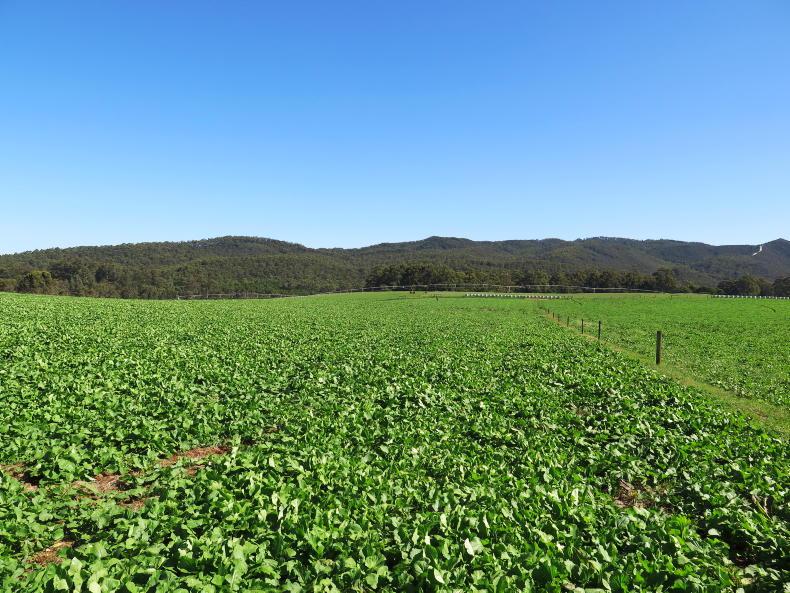
Summer crop on the Gunningham farm in Tasmania.
His words at the time were: “The easiest way to farm is to put in meal when grass is scarce, spread nitrogen to make grass grow and top the fields after grazing to get a good residual. But the problem with doing all of this is that your costs of production go up, you make less money most years and no money when milk price is bad. You work a lot harder and it’s actually bad for the environment.”
Fast forward to today and the Gunningham farm business is in a totally different place to where it was just four years ago.
Matthew is attending this year’s Positive Farmers Conference as the keynote speaker and his story will be really interesting to all dairy farmers.
Rethink
Matthew says that prior to the change, they were spending a lot of time communicating with their business partners and filling in information for reports – work that they didn’t really enjoy doing.
Large corporate farming businesses were investing in farms in the area and were competing for top-performing farm managers and farm staff. Wage costs in Australia are already extremely high, Matthew says it takes 3.1kg of milk solids to pay an hour’s wage in Australia whereas it takes about 2kg milk solids to do the same in Ireland.
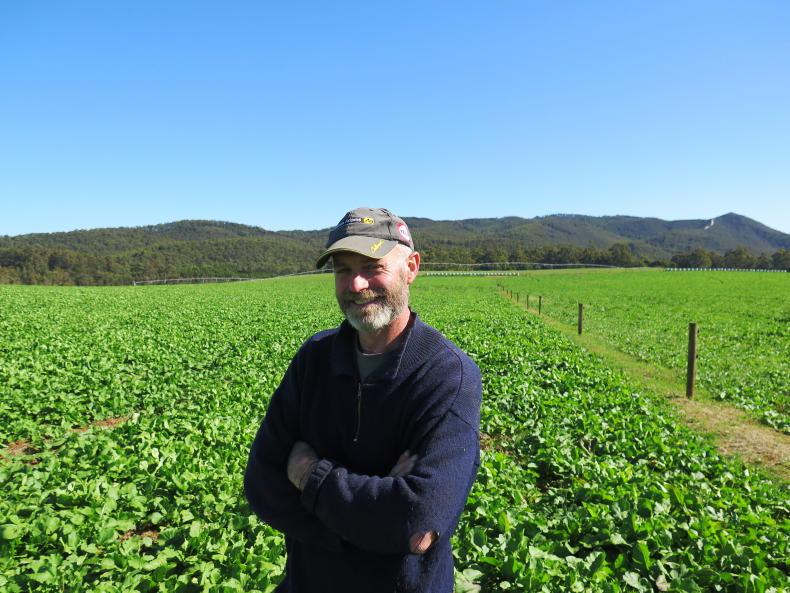
Matthew Gunningham, Tasmania, Australia will be present in person at this year's Positive Farmers Conference.
“We had a feeling that over time even our farms had become too intensive and decision heavy. The extra workload imposed by these intensive higher-input systems makes them harder to manage due to high workloads, lots of day-to-day decisions and a requirement for larger teams to cover the work. “In my view, larger teams are harder to manage and less satisfying to work in,” he says.
Matthew says that consumers are getting increasingly concerned about the environment and that awareness around animal welfare is growing;
“Even if the end consumer of our product is from a poorer country and doesn’t think much about animal welfare and the environment, the community in which we operate does care about those things,” he says.
He says consumers are getting increasingly concerned about the use of synthetic nitrogen, herbicides, pesticides, hormone treatments and antibiotics. He says he was also concerned about the risks of key inputs rising in cost, such as feed, fertiliser, fuel and electricity – all of which have since increased in cost due to the war in Ukraine.
Redesign
The Gunningham farm is a very different business today to where it was four years ago.
Matthew and Pip have exited the equity partnership arrangements and are now running two 700-cow dairy farms and running 700 replacement heifers, along with 400 beef-cross calves which are sold as stores.
On top of this, they also have their own herd of purebred Aberdeen Angus cows to generate beef bulls for the dairy herds. There are 1,700 free-range hens kept in mobile coops which are moved around the farm after the cows, with the eggs sold locally.
As before, no concentrate feeds are used for the dairy herd, with the focus entirely on grassland management to drive performance. In the past, Matthew toyed with once-a-day milking for part of the year or on part of the herd but now both herds are 100% once-a-day milking. Silage is no longer being made, with one-third of a bale of hay per cow being made instead. Standing hay or deferred grass is used as a buffer during the routine summer droughts and a long rotation length is used to get through the winter.
To make this work, the production season is shorter than normal and Matthew says that the focus, from the middle of the season onwards is on managing grass and cow body condition score in order to have a good start to the next season. If this means drying the herd off early, then that is what is done.
Once we had established this farming system on our own two farms, we could see how well it worked
The thinking behind this farming system is to make the farms really easy to run and with less work involved, the farms will be a more attractive place to work for employees. By dramatically reducing costs, margins increased and the farm remained profitable even with less milk produced.
In a plot twist, the farms are also converting to organic milk production.
“Once we had established this farming system on our own two farms, we could see how well it worked. At the time, a company that processed organic milk was looking for potential suppliers and held information sessions.
“We realised that our system was close to organic and with a couple of small changes we could become certified. The key would be to maintain our very low cost of production and collect a premium for our milk. It was fundamental to us that the business model should not rely on the organic premium to work. It had to be able to achieve a commercial return at conventional prices,” Matthew says.
Matthew will be at the Positive Farmers Conference in person where he will speak about his farming journey to date and about the steps he has taken in order to make his farm a more people-friendly place to work.
About the conference
This year’s Positive Farmers Conference is taking place on 28 and 29 June at the Radisson Blu Hotel in Little Island, Co Cork. The event is sponsored by the Irish Farmers Journal and will feature topics such as breeding, stocking rates, managing change and dealing with input price volatility. Tipperary dairy farmer Gerry McGuire will also tell his story on how he has increased cows on his farm from 50 to 200 over the last 10 years. Tickets are available at www.positivefarmers.ie
Back in 2018, the Irish Farmers Journal visited Tasmania as part of a trip to New Zealand and Australia.
We published a report at the time on Matthew Gunningham, who was milking 5,500 cows across seven farms in Tasmania – an island located 300km from Melbourne and 2,000km from New Zealand.
Three of the farms were owned by Matthew and his wife Pip while they were equity partners in the other four, three of which he managed. The other partners in these farms were corporate funds who invested in farming – common practice in Australia and New Zealand.
At the time, I got a real sense that Matthew’s thinking was beginning to change. Fresh from a Nuffield Scholarship, he was moving away from bobby calves (sending calves to slaughter at a young age).
He was starting to sow multispecies swards and was generally backing away from conventional thinking about how best to manage spring-calving, grass-based dairy farms. This is despite the fact that he wasn’t even buying in any supplement at the time – he was a hardcore low-input farmer.

Summer crop on the Gunningham farm in Tasmania.
His words at the time were: “The easiest way to farm is to put in meal when grass is scarce, spread nitrogen to make grass grow and top the fields after grazing to get a good residual. But the problem with doing all of this is that your costs of production go up, you make less money most years and no money when milk price is bad. You work a lot harder and it’s actually bad for the environment.”
Fast forward to today and the Gunningham farm business is in a totally different place to where it was just four years ago.
Matthew is attending this year’s Positive Farmers Conference as the keynote speaker and his story will be really interesting to all dairy farmers.
Rethink
Matthew says that prior to the change, they were spending a lot of time communicating with their business partners and filling in information for reports – work that they didn’t really enjoy doing.
Large corporate farming businesses were investing in farms in the area and were competing for top-performing farm managers and farm staff. Wage costs in Australia are already extremely high, Matthew says it takes 3.1kg of milk solids to pay an hour’s wage in Australia whereas it takes about 2kg milk solids to do the same in Ireland.

Matthew Gunningham, Tasmania, Australia will be present in person at this year's Positive Farmers Conference.
“We had a feeling that over time even our farms had become too intensive and decision heavy. The extra workload imposed by these intensive higher-input systems makes them harder to manage due to high workloads, lots of day-to-day decisions and a requirement for larger teams to cover the work. “In my view, larger teams are harder to manage and less satisfying to work in,” he says.
Matthew says that consumers are getting increasingly concerned about the environment and that awareness around animal welfare is growing;
“Even if the end consumer of our product is from a poorer country and doesn’t think much about animal welfare and the environment, the community in which we operate does care about those things,” he says.
He says consumers are getting increasingly concerned about the use of synthetic nitrogen, herbicides, pesticides, hormone treatments and antibiotics. He says he was also concerned about the risks of key inputs rising in cost, such as feed, fertiliser, fuel and electricity – all of which have since increased in cost due to the war in Ukraine.
Redesign
The Gunningham farm is a very different business today to where it was four years ago.
Matthew and Pip have exited the equity partnership arrangements and are now running two 700-cow dairy farms and running 700 replacement heifers, along with 400 beef-cross calves which are sold as stores.
On top of this, they also have their own herd of purebred Aberdeen Angus cows to generate beef bulls for the dairy herds. There are 1,700 free-range hens kept in mobile coops which are moved around the farm after the cows, with the eggs sold locally.
As before, no concentrate feeds are used for the dairy herd, with the focus entirely on grassland management to drive performance. In the past, Matthew toyed with once-a-day milking for part of the year or on part of the herd but now both herds are 100% once-a-day milking. Silage is no longer being made, with one-third of a bale of hay per cow being made instead. Standing hay or deferred grass is used as a buffer during the routine summer droughts and a long rotation length is used to get through the winter.
To make this work, the production season is shorter than normal and Matthew says that the focus, from the middle of the season onwards is on managing grass and cow body condition score in order to have a good start to the next season. If this means drying the herd off early, then that is what is done.
Once we had established this farming system on our own two farms, we could see how well it worked
The thinking behind this farming system is to make the farms really easy to run and with less work involved, the farms will be a more attractive place to work for employees. By dramatically reducing costs, margins increased and the farm remained profitable even with less milk produced.
In a plot twist, the farms are also converting to organic milk production.
“Once we had established this farming system on our own two farms, we could see how well it worked. At the time, a company that processed organic milk was looking for potential suppliers and held information sessions.
“We realised that our system was close to organic and with a couple of small changes we could become certified. The key would be to maintain our very low cost of production and collect a premium for our milk. It was fundamental to us that the business model should not rely on the organic premium to work. It had to be able to achieve a commercial return at conventional prices,” Matthew says.
Matthew will be at the Positive Farmers Conference in person where he will speak about his farming journey to date and about the steps he has taken in order to make his farm a more people-friendly place to work.
About the conference
This year’s Positive Farmers Conference is taking place on 28 and 29 June at the Radisson Blu Hotel in Little Island, Co Cork. The event is sponsored by the Irish Farmers Journal and will feature topics such as breeding, stocking rates, managing change and dealing with input price volatility. Tipperary dairy farmer Gerry McGuire will also tell his story on how he has increased cows on his farm from 50 to 200 over the last 10 years. Tickets are available at www.positivefarmers.ie







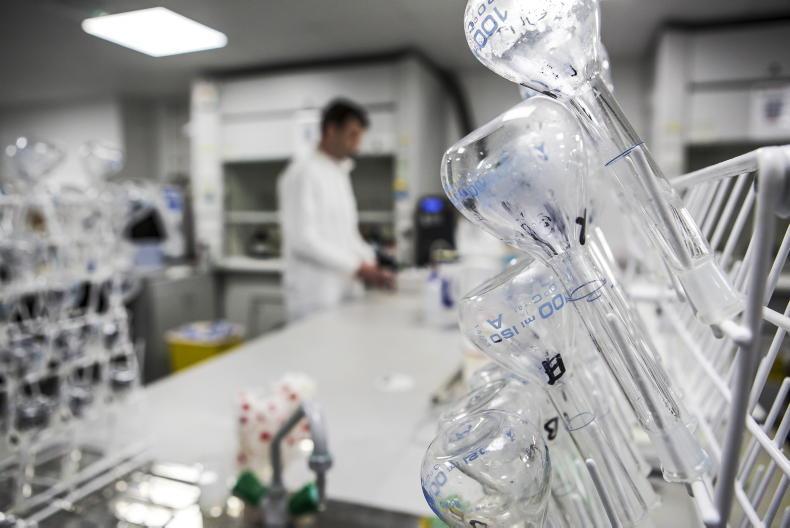
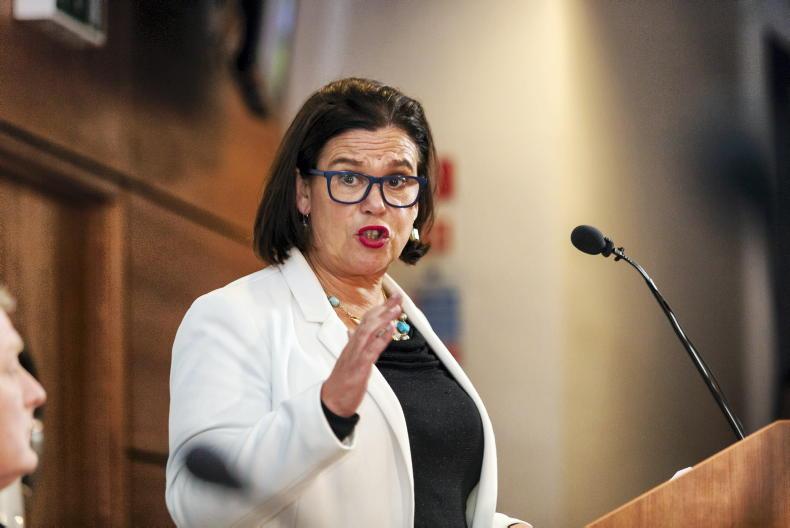
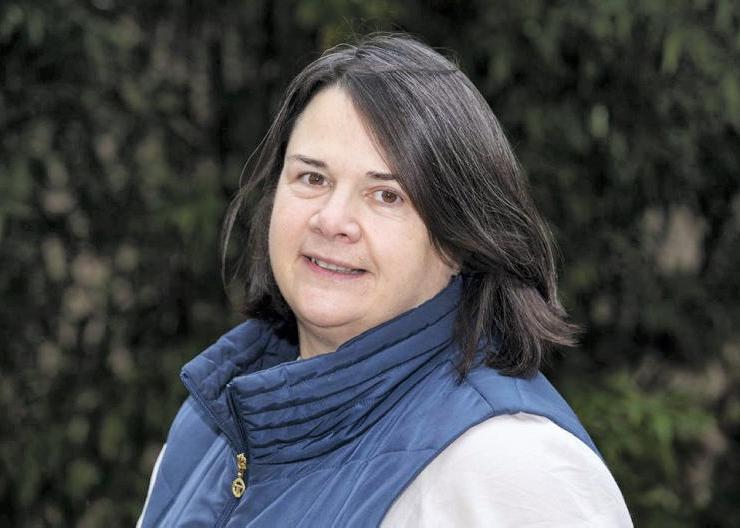

SHARING OPTIONS